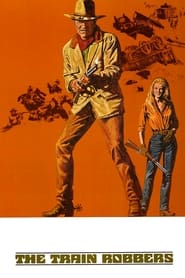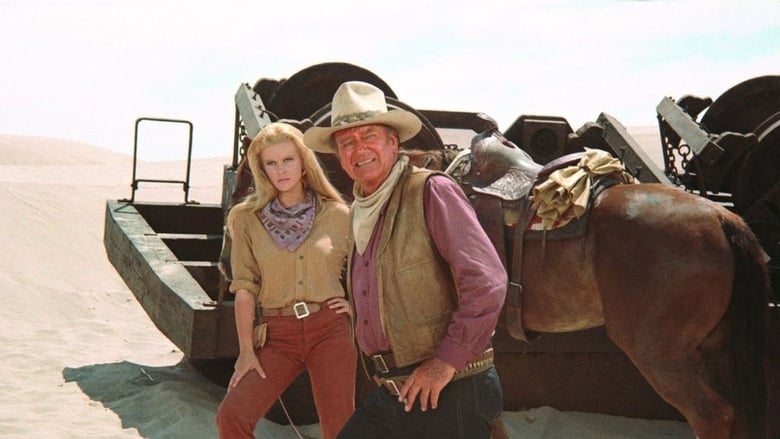“The Train Robbers” is a 1973 Western film directed by Burt Kennedy. A group of determined individuals embarks on a perilous journey to recover stolen gold from a buried cache. With grit and determination, they navigate treacherous terrain and face formidable foes, all for the ultimate prize. Led by an enigmatic widow, they unravel secrets and outsmart their pursuers in a high-stakes game of cat and mouse. This riveting tale showcases the relentless pursuit of justice amidst breathtaking landscapes and explosive action sequences.

CLICK HERE⭣⭣⭣📽️_Watch The Train Robbers 1973 English Subtitles_
Review
“The Train Robbers”: A Bold Adventure Unveiled
It was an early morning when news broke of a daring train robbery somewhere amidst the untamed wilds of the American West. The story had all the hallmarks of great Hemingway fiction: courageous men, vast landscapes, and a battle against insurmountable odds. Little did we know that this was not merely a tale spun by our beloved author but a gripping movie entitled “The Train Robbers,” directed by Burt Kennedy.
The plot unfolds with remarkable simplicity, reminiscent of Hemingway’s uncomplicated prose. A widow, Mrs. Lowe (portrayed by the radiant Ann-Margret), seeks to reclaim stolen gold buried by her late husband. In her pursuit, she enlists the aid of Lane (played effortlessly by John Wayne), a rugged and resourceful cowboy with a heart as big as the plains themselves.
As their journey commences, we witness a convergence of characters that Hemingway himself would be proud to have created. There is Grady (Ben Johnson), the loyal sidekick who never falters in his unyielding support for Lane. Then there’s Jesse (Rod Taylor), an enigmatic gunslinger whose motives remain ambiguous until the film’s climactic resolution.
The train robbery itself is executed with expert precision, much like Hemingway’s surgical descriptions in “For Whom the Bell Tolls.” Kennedy captures every detail with artistic flair without sacrificing tension or pacing. Each scene is painstakingly crafted to maximize suspense and engage viewers in this thrilling escapade across rugged terrains and treacherous river crossings.
Throughout “The Train Robbers,” one cannot help but appreciate the beauty brought forth by both cast and crew. The cinematography captures sweeping vistas that stretch as far as the eye can see – an ode to nature’s grandeur just as Hemingway often celebrated it in his works. The haunting score, composed by Dominic Frontiere, embraces the soul of the American West, acting as a silent protagonist in its own right.
Though it may not have received the accolades it deserved upon release, “The Train Robbers” achieved a degree of popular success befitting its Hemingway-esque spirit. Audiences flocked to witness Wayne’s charismatic portrayal of Lane and Ann-Margret’s luminous presence on screen. At its core, the film delivers an experience that resonates with viewers on a primal level – an escape into a world where courage and perseverance reign supreme.
While Hemingway himself preferred words over action, “The Train Robbers” manages to capture his essence through dialogue that is stark, concise, and full of underlying meaning. Conversations between characters are sparse but convey volumes in their brevity. Each line serves as a testament to Kennedy’s understanding of Hemingway’s style – less is always more.
As is often the case with movies of this magnitude, gossip inevitably seeps into our conversations. Rumor has it that during filming, Wayne insisted on performing his own stunts – a testament to his unwavering dedication to bringing Lane to life. Such commitment only enhances the raw authenticity conveyed by Wayne throughout the film.
It would be remiss not to mention the film’s critical reception and its place in cinematic history. While some critics found fault in its simplicity or dismissed it as mere entertainment, others recognized “The Train Robbers” for what it truly represents: an ode to Hemingway’s literary legacy translated onto celluloid with integrity and passion.
In conclusion, “The Train Robbers” stands as a testament to Hemingway’s indelible influence on culture and storytelling – even outside the written page. Burt Kennedy’s direction captures both the spirit and substance of Hemingway’s narratives, while the exceptional cast breathes life into characters that embody bravery and resilience.
Whether you are a fan of Hemingway’s timeless prose or simply seek an adventure that will transport you to the vast plains of the American West, “The Train Robbers” is a film that should not be missed. Its seamless fusion of action, drama, and Hemingway’s unmistakable style leaves an indelible mark on all who embark on this unforgettable journey.
Technical Data

- Release : 1973-02-07
- Runtime : 92
- Genre : Western, Action
- Cast : John Wayne as Lane, Ann-Margret as Mrs. Lowe, Rod Taylor as Grady, Ben Johnson as Jesse, Christopher George as Calhoun
- Crew : John Wayne as Executive Producer, Ray Moyer as Set Decoration, Burt Kennedy as Director, Burt Kennedy as Writer, Terry Leonard as Stunts
- Revenue : 0
- Budget : 0
- Company : Batjac Productions
- Popularity : 8.118
- Summary : A gunhand named Lane is hired by a widow, Mrs. Lowe, to find gold stolen by her husband so that she may return it and start fresh.
- Tagline : The gold or the grave. The young widow could lead them to either.
